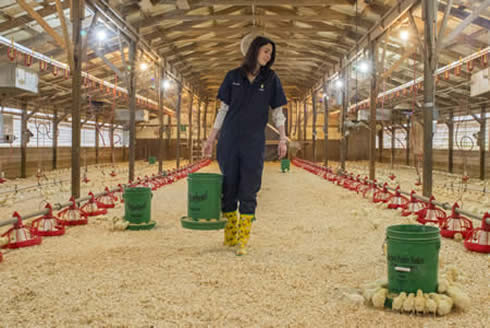Resident Honored with Reed Rumsey Clinical Research Award

Seiche Genger in the College of Veterinary Medicine Teaching Animal Unit’s Poultry Unit. Photo by Mccaide Wooten.
Seiche Genger, a resident in the Department of Population, Health and Pathobiology in NC State University’s College of Veterinary Medicine, is a recipient of the 2015 Reed Rumsey Clinical Research Award for the Advancement of Avian Medicine presented by the American Association of Avian Pathologists.
The national award will be presented at the American Veterinary Medical Association/ American Association of Avian Pathologists, Poultry Science joint meeting July 11-14 in Boston. In addition to honoring significant avian research by a veterinary student, graduate student, resident, or intern, the award includes $1,000 plus travel expenses to attend the annual meeting.
Dr. Genger is being recognized for her work comparing the size and shape of intestines and body weight of turkeys raised in the NC State College of Veterinary Medicine Teaching Animal Unit (TAU) with that of a sister flock raised in another commercial environment.
Both flocks had the same breeder source, genetic lines, and nutrition but differed in the management/ husbandry practices employed. Each flock was placed with two genetic lines of turkey hens in equal proportions. The same two sample preparation techniques were used for both flocks that were followed from day of hatch through processing. Ten birds were sampled from each genetic line in each flock on a weekly basis for a total of 40 samples each week.
The TAU turkeys reached their specified target weight for processing approximately two weeks earlier than the sister flock, suggesting something is happening in the intestine of the commercial flock at an early age that causes the bird to grow longer intestines than their TAU counterparts.
“The original hypothesis was the heavier birds would have more intestine, which makes sense because they would have more surface area to absorb nutrients,” says Genger. “However, the opposite occurred in my research. The TAU birds appear to have more efficient intestines rather than increasing their mass. The reason this is important is that we don’t know what is stimulating the bird to respond this way, and it may lead to a better understanding of how intestinal structure and form relates to weight gain. Further, we might be able to standardize a quick method in the field to evaluate flock intestines without having to take the samples and time needed for histopathology.”
Genger, who also is studying for masters of specialized veterinary medicine, will discuss her research at the July AVMA/AAAP annual meeting as part of the award presentation.
“Dr. Genger has the attributes that Dr. Rumsey was seeking to recognize,” Dr. Oscar Fletcher said in his letter of support to the AAAP Awards Committee. Fletcher praised Dr. Genger’s research efforts and other aspects of her residency program, saying she is well-prepared and an excellent public speaker.
“My research evaluating the parameters of growing commercial birds has given me a better understanding not only of the physiology of intestinal health, but also how we can utilize the mechanisms of the gut itself as it responds to the environment to evaluate and intervene in growth regulation,” says Genger.
“I look forward to utilizing this education and research to improve intestinal health models and monitoring techniques in the field,” she continues. “A solid understanding of how a chicken, turkey, or other avian species adjusts to feed and pathogens will allow us to implement important management changes. I hope to continue to expand this research into a deeper understanding of how the intestinal tract responds to environmental challenges and apply that education to global production.”
This is the fourth time in five years that a NC State poultry researcher has been recognized with the Reed Rumsey Award. Kabel Robbins received the honor in 2011, Takumu Niino in 2013, and Christina Parr Lindsey in 2014.
The Reed Rumsey Award for the Advancement of Avian Medicine is named for the respected scientist who served the AAAP in various roles as vice president, president, and as a member of the Board of Directors. He bequeathed $25,000 to the AAAP for the establishment of an award program that recognizes significant contributions to avian medicine.
- Categories:


